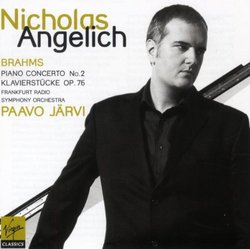The best Brahms Second in years
Santa Fe Listener | Santa Fe, NM USA | 06/09/2010
(5 out of 5 stars)
"The old order changeth, but sometimes not for record collectors, if they have long memories. The Brahms Second has received some towering recordings from Edwin Fischer, Rudolf Serkin, Maurizio Pollini, Daniel Barenboim, and Sviatoslav Richter, with more than a casual nod to Leon Fleisher, Wilhelm Backhaus and Ivan Moravec, to speak from my own preference. I want the pianist to be a titan and the conductor to be an equal partner, making of the accompaniment a fifth Brahms symphony. With those expectations, I was ready to shrug off Nicholas Angelich and Paavo Jarvi, but that's never a good idea. Aided by very vivid recorded sound, the two enter the ring with ambitions to challenge the greats. Angelich's interpretation is as sweeping and full of grandeur as any I've heard, and Jarvi provides a fully symphonic frame for the heroic solo part. They make the music sound urgent, and there's not a moment of cool, laid-back playing to be found.
This performance will satisfy those who feel that Brahms built his orchestral sonority from the bottom up, since the double basses are brought forward to underpin everything. The piano is a beautiful instrument, with an even tone that has no pings in the high treble range or buzzing in the bass. The tempos are well balanced, without being too frenetic in the Scherzo and nicely flowing in the Andante (too often turned into a dragging Adagio). The solo cello in this movement isn't memorable, but like the rest of the Frankfurt Radio orchestra, which Jarvi took over in 2006, he's responsive and engaged. It's rare today to hear an orchestra rise to the occasion in such thrice-familiar music, but this one does.
Angelich's only flaw, really, is that he isn't very individual. One would never sit up and say "Oh, Angelich, of course," the way one recognizes Richter, Serkin, and Horowitz. Yet this isn't Angelich's fault. With very few exceptions (Argerich, Kissin, Pletnev) the old order really has passed, and the new has brought in pianists who don't aim to have a sharp personality profile. I don't want to imply that Angelich is sterile; he hardly makes a single misstep musically, involving us through his own involvement. He navigates the tricky finale very well, sounding light and rhythmic without trivializing Brahms's nimble thematic ideas (which have seemed like a letdown to many critics over the decades). Jarvi is particularly ardent in the finale, taking over more than half the burden of making this movement sound convincing. (I have never been a fan of his, but this CD shows me why he's a hot item -- Jarvi will take over the Orchestre de Paris in the upcoming season.)
The filler is all eight of the Klavierstucke Op. 76, which are among Brhams's most attractive and romantic solo works. Again the piano sound is ravishing, and Angelich remains in the groove. Altogether, this surprising CD reminded me that times don't necessarily change for the worse. I felt hopeful afterwards."


 Track Listings (12) - Disc #1
Track Listings (12) - Disc #1